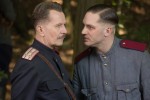“Child 44” is a melting pot of a film in which director Daniel Espinosa throws a dollop of murder mystery, a soupçon of spy thriller, a pinch of political drama and to top it off, a generous dose of gut-wrenching action.
The result is a movie which thrills and shocks while keeping the audience engrossed in the pulsating story of Leo Demidov (Tom Hardy) and his wife Raisa (Noomi Rapace), yet at times it leaves the viewer baffled as to which of the many plot lines is the most important.
Swedish director Espinosa’s only previous venture into U.S. cinema came in the form of the very ordinary Denzel Washington shoot-em-up flick “Safe House.” Thankfully, with “Child 44,” he manages to retain the visceral, frenetic action of “Safe House” and add more nuanced and often tragic touches.
Leo Demidov is a starving orphan turned Soviet war hero. He embarks on a career in the MGB – predecessor to the KGB, the former Soviet secret police – where he quickly learns that rooting out traitors is a priority which involves often ignoring and even manipulating the truth. He is thrust into a crisis of conscience when his wife is named as a spy to the West, giving his sadistic superior Major Kuzmin (Vincent Cassel) the opportunity to test his own loyalty by putting him in charge of the investigation.
At the same time, the son of Leo’s best friend Alexei Andreyev (Fares Fares) is found mutilated near a set of train tracks. While the bureau declares the event to be a “tragic accident,” Alexei is convinced otherwise, and he begs Leo to investigate further. Leo is caught in the current of a shark pool of political intrigue and deception. Any false move could condemn him and his wife to exile or even death.
The greatest strength of “Child 44,” which is to be expected when such critically acclaimed names are involved with the project, is the cast. Hardy continues to broaden his repertoire, building on the tough guy persona that he has established through roles such as Charles Bronson and Bane by adding a more conflicted, heartfelt performance.
Alongside him, Rapace portrays Raisa Demidov with appropriate lucidity which tantalizingly keeps the audience guessing as to where her true allegiances lie. She oscillates from fraternizing with mysterious figures to assuring Leo with tear-infused sobs that she is not a spy; however, ultimately the pair are united in the cause of unmasking the prolific child killer.
The seemingly ever-present Gary Oldman lends his trademark conviction to the ensemble in the role of General Mikhail Nesterov who, like Leo, has to walk the treacherous tightrope of keeping the Party happy and his family safe. Oldman’s convincing Russian accent leaves us wondering, is he doing a tour of international accents as some sort of bet? Is there an accent on the planet that he is not capable of mastering?
Whatever the case may be, Oldman is almost upstaged in the minor roles category by Joel Kinnaman, who plays the film’s central antagonist, Vasili Nikitin. Kinnaman brings a satisfying amount of sliminess and detestability to the role, while also making sure not to become a pantomime villain.
“Child 44,” although an entertaining film, stops short of being an outstanding production because of the inconsistency of the Russian accents. For the most part, there was clearly a consensus among the cast and the director that they were all going to adopt Russian accents. However there is one occasion in particular where a minor member of the MGB proudly says his one line with a voice that can only be described as blatantly posh and obviously British. This jarring note is compounded by the cameo appearance of Charles Dance at the very end, who also seems to barely make an effort to mask his dulcet British tones.
At times, “Child 44” wants to be too many things. Although the mixture of genres is at first intriguing, as the film progresses, the plot becomes too convoluted. The idea to have a political thriller set in Stalinist Russia is an interesting one, and the decision to make a slasher flick based on a real-life Russian serial killer also has great potential; however, combining both just feels like too much.
These inconsistencies only serve to distract from what is otherwise a well-made, gripping film. The compelling performances, combined with an earthy directorial style, help to starkly mirror the brutal conditions imposed on the Russian people under Stalin.
– William Thorne
